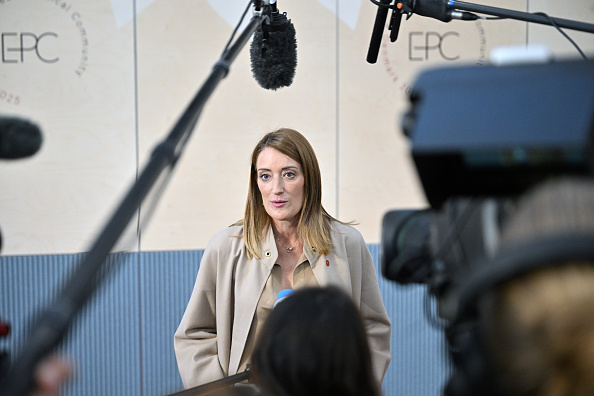Three years after the Qatargate scandal shook the EU to its core, the European Parliament is quietly pushing back against Belgian authorities investigating allegations of wrongdoing among lawmakers.
A Euractiv investigation has uncovered testy exchanges between members of Parliament’s Legal Affairs Committee and a senior Belgian prosecutor, signalling a showdown over the role Belgium’s judiciary should play in policing the EU’s democratic institutions.
Though the clash surrounds the narrow question of whether to lift the immunity of MEPs suspected of wrongdoing, its outcome could carry profound implications for the oversight of Europe’s central bodies.
Cash-filled suitcases
In 2022, after revelations of cash-filled suitcases in European Parliament Vice-President Eva Kaili’s private flat, Parliament President Roberta Metsola pledged sweeping reforms and full cooperation with Belgian investigators, then hailed as the bloc’s new anti-corruption sheriffs.
But three years after the shock of “Qatargate” – the still-unfolding probe linking lawmakers to alleged payoffs from Qatar and Morocco – the mood could hardly be more different.
When news broke in March of a fresh Belgian inquiry into the Parliament – this time tied to alleged influence operations by Chinese telecoms giant Huawei – Metsola and many in the chamber bristled. Rather than promising transparency, Parliament turned defensive, openly questioning the credibility of Belgium’s judicial system.
Belgium under growing scrutiny over stalled EU corruption probes
Frustration is mounting over Belgium’s limited resources and judicial missteps in high-profile corruption cases with…
4 minutes

The flashpoint came when prosecutors sought to lift the immunity of an MEP suspected of attending a Huawei-related event – only to discover the lawmaker had never been there. Metsola denounced what she called “carelessness” and vowed to protect the institution from reputational harm.
Since then, Parliament has resisted further Belgian requests to lift the immunities of four other lawmakers – in what has become a discreet institutional tug-of-war with the judiciary, Euractiv found.
Confidential exchanges between members of Parliament’s Legal Affairs Committee and the Belgian prosecutor leading the case show mounting mistrust on both sides. Six months after the immunity waivers were requested, Parliament has yet to set a vote, with MEPs still arguing over whether to lift their colleagues’ protections and criticising the prosecutor’s approach behind closed doors.
The dispute exposes a deeper flaw in the EU’s architecture: Parliament’s governance was never designed to withstand today’s scale of private and foreign influence campaigns, leaving it ill-equipped to cope with the vast grey zone that has emerged between lobbying, “business as usual”, and outright corruption.
That has left the body exposed on two fronts – to Belgian prosecutors who often see criminal patterns where many MEPs just see politics, and to a Belgian judiciary hampered by its limited powers against an EU institution shielded by immunity.
Kill it with bureaucracy
As both sides dig in, the EU’s accountability problem is once again paralysed by bureaucratic skirmishes – a system where scandals vanish behind forms, committees, and procedure.
At the centre of the row is Parliament’s 25-member Legal Affairs Committee, charged with reviewing Belgium’s request to lift the immunities of four MEPs linked to the Huawei probe. Huawei, which has not been charged, said two employees violated local laws and were dismissed, adding that it is cooperating fully with judicial authorities.
Confessions of a Huawei lobbyist
Valerio O., a former senior public affairs manager for Huawei in Brussels, once navigated the…
10 minutes

In early July, committee members summoned Belgian federal prosecutor Ann Fransen for a closed-door session described by two attendees as “tense” – an account later confirmed in a letter from committee chair Ilhan Kyuchyuk to Fransen.
Kyuchyuk wrote that Belgium’s case was “not substantiated sufficiently” to reach a conclusion. He demanded further details on the alleged offences, their legal basis, and any concrete evidence tying lawmakers to the accusations. MEPs even questioned the legality of the request itself, Euractiv found.
While those demands appeared procedural, Fransen’s September reply made clear prosecutors viewed them as a direct challenge, according to parliamentary sources.
Prosecutors push back
In her response, Fransen said MEPs were meant only to verify whether an immunity request was politically motivated – not to demand access to evidence.
Fransen warned that such requests risked undermining investigative secrecy and the presumption of innocence, and could jeopardise the probe by tipping off suspects or damaging reputations if details were leaked.
Responding to calls for more justification, Fransen argued that immunity requests must be made as soon as credible indications of wrongdoing emerge – even before full evidence is gathered – since investigators cannot proceed without Parliament’s authorisation.
Under Belgium’s interpretation of EU law, immunity prevents prosecutors from collecting key evidence – including statements from MEPs – until Parliament approves. Yet members of the Legal Affairs Committee continue to press prosecutors for stronger proof before granting that permission.
Asked for comment, Belgium’s federal prosecutor’s office said it would “refrain from making any” given the ongoing procedure.
Growing frustration
The standoff risks freezing inquiries into potential EU wrongdoing as MEPs grow more reluctant to grant Belgian immunity requests.
The Legal Affairs Committee typically takes around five months to process such cases, with some stretching beyond a year – though most are ultimately approved. This time, however, the machinery has slowed to a crawl. Resistance to the Huawei probe, one committee member told Euractiv, is “unprecedented”.
Inside Parliament, frustration is mounting. Some MEPs privately acknowledge that immunity decisions have become bargaining chips in inter-group politics – amid accusations of backroom manoeuvres to shield the institution or certain political families from scrutiny. Others simply accuse prosecutors of inflicting reputational harm without sufficient evidence.
In June, Metsola pledged to overhaul cooperation procedures with Belgian police, warning that lawmakers’ reputations were being damaged by unverified allegations made public too early. As part of the Huawei probe, Belgian authorities even withdrew one immunity request after an error. Later that summer, Metsola sent a formal letter to member states – seen by Euractiv – reminding them of the rules governing such requests.
“When required, the European Parliament fully cooperates with law-enforcement and judicial authorities to assist the course of justice and will continue to do so,” a Parliament spokesperson said, declining further comment.
For now, that cooperation appears to have hit a wall.
Eddy Wax and Nicoletta Ionta contributed reporting.
(mhk, cz)
